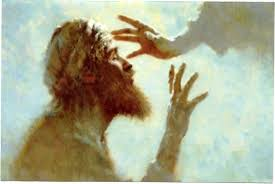 In the Gospel lesson for tomorrow you will hear how the disciples see a man who was born blind and they ask the great “why” question. Who sinned, this man or his parents that he should be born blind? I guess I have to rephrase it – “why was this man born blind? Was it his or his parents fault?”
In the Gospel lesson for tomorrow you will hear how the disciples see a man who was born blind and they ask the great “why” question. Who sinned, this man or his parents that he should be born blind? I guess I have to rephrase it – “why was this man born blind? Was it his or his parents fault?”
We do the same in our life. We have an issue and we ask “why is this happening to me” and the “this” is defined by us. Tragedy is in the eye of the beholder. Some of the young people that I know are reduced to quivering fountains of tears if they can’t go on spring break like they used to before they supposedly got a job and supposedly became responsible grown up folks. “Why is this happening to me “they say, “when I am supposedly doing the right thing getting a job?” Lots of supposing there. I am a veteran pastor who supposedly has a fixed reliance and understanding of the object of my preaching and teaching, the object of my faith, Jesus Christ. The preached Christ is all mercy and compassionate care for the fallen children of men. He did not come to condemn the world but to save it. He is love. Yet when trouble and tragedy and pain come to my life I want to get from the preached Jesus an answer that God as Creator does not choose to give. He wants to, as Luther says, “be inscrutable and remain incomprehensible”. It is a strange trait that folks try to find answers where God chooses not to speak rather than flee and hide in Christ who has been given to us as Savior and who reveals Himself in Word and Sacrament.
John Pless has written this – “Unexplainable tragedies bring pain and chaos. God leaves the wound open to use the words of Bayer.* We cry out to God in lamentation in the face of events that defy our capacities for understanding. But the anguished lament ascends from the crucible of faith, not unbelief. It is a confession of trust in the God who works all things for the good of those who called (Rom. 8:28). Living in repentance and faith, we are freed from the inward turn of speculation that seeks to investigate the hidden God and instead we trust in the kindness and mercy of God revealed in Christ Jesus. With such a freedom we are liberated to rely on God’s promises and turn our attention to works of mercy to bring compassion and relief to those who suffer in this sinful world. What is the nature and shape of this mercy? Mercy is the Lord’s compassionate action toward sinful human beings in that He does not leave us alone with our sin, forsaking us to death and condemnation, but instead rescues us by His death and resurrection to live with Him.”+
*Oswald Bayer, “Poetological Doctrine of the Trinity” Lutheran Quarterly (Spring 2001), 19-20
+John Pless, Answering the “Why” Question; Martin Luther on Human suffering and God’s Mercy”, Journal of Lutheran Mission February 2015, Vol.2 No.1.

